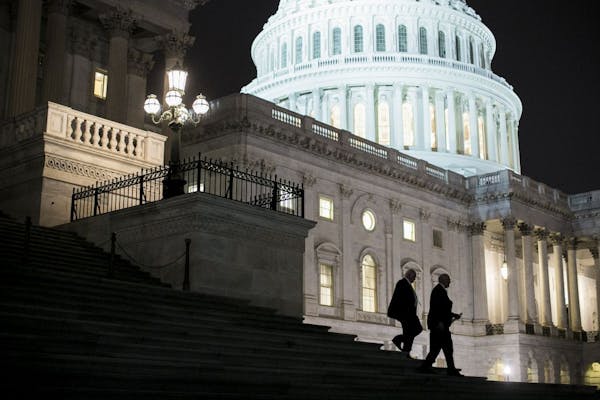WASHINGTON - The agonizing finale to the fiscal cliff deal in Congress gave Minnesotans on Capitol Hill little to brag about Wednesday as a new political season unfolds with even tougher votes ahead and another election year looming.
The deal protects more than 2 million middle-class Minnesotans from tax hikes, but leaves farm subsidies and other domestic programs in limbo as Congress hurtles toward another spending cliff in 60 days.
That's when President Obama and congressional Republicans will face off over the nation's debt limit and more than $1 trillion of budget cuts scheduled to kick in during the next decade.
In Minnesota, much of the focus in the next round will fall on U.S. Rep. John Kline, a close ally of House Speaker John Boehner, who outraged some in his party Tuesday by voting for the compromise bill that raises taxes on the wealthiest Americans.
Those higher-income tax rates, which kicked in on New Year's Day, could affect about 15,000 Minnesotans with incomes above $400,000. Similarly, about 12,200 jobless workers in the state will be spared a cutoff of extended unemployment benefits. And while most Minnesotans escaped income tax increases, they'll still feel a pinch in their paychecks. Part of the compromise allows a temporary, 2 percent payroll tax cut to expire.
The landmark vote also alters the political landscape in Minnesota, particularly in the Republican Party, where Kline and U.S. Rep. Erik Paulsen have both been regarded as strong contenders for statewide office.
Paulsen, sometimes mentioned as a potential GOP challenger to Sen. Al Franken, voted against the deal -- a move certain to burnish his conservative credentials and win favor with party activists. Franken voted for it, as did fellow Democratic Sen. Amy Klobuchar and all but eight senators and 167 House members.
'No good option'
Given the overwhelming, bipartisan support for the Senate-brokered agreement that averted the fiscal cliff, the long-term implications of Paulsen's vote are uncertain, highlighting the risks for politicians in both parties.
Republicans were forced to weigh their unhappiness with the lack of spending cuts against the dire economic consequences predicted from going over the cliff.
"From a conservative Republican standpoint, there was no good option," said Minnesota GOP Party Chairman Pat Shortridge. "You're trying to make the best of a bad situation."
Still, Kline's yes vote triggered immediate calls for his head among the GOP ranks, including from party activist Andy Parrish, a former aide to U.S. Rep. Michele Bachmann, who voted against the cliff agreement. On Twitter and Facebook, Parrish suggested it was time to "primary" Kline, a reference to challenging his GOP endorsement.
"Can we recall the GOP endorsement of @repjohnkline?" Parrish tweeted.
Kline stressed the importance of locking in permanent tax relief for the middle class and small businesses, while acknowledging that the battle for spending reductions will have to be pressed in coming months.
Paulsen cited a local concern in casting his no vote: The cliff deal provides none of the tax relief Paulsen has sought for Minnesota's medical technology sector, which faces billions of dollars in special assessments under Obama's new health care law.
"It's unconscionable that the Senate chose to give hundreds of millions of dollars in tax breaks to industries like Hollywood and NASCAR," Paulsen said, "but chose not to stop the devastating new tax on the life-saving and life-improving medical device industry."
Wind power, another important Minnesota industry, won a big victory with the extension of production tax credits that Kline opposed, in part because of a controversial wind power farm proposed near Red Wing in his district.
'Work order'
Republicans aren't alone in feeling uneasy about the effect of the bill in Minnesota. Rural Rep. Collin Peterson was among 16 House Democrats to oppose the deal, in part because it affords only a one-year extension of existing farm programs designed largely to avoid a feared spike in milk prices.
The deal not only ignores long-term reforms Peterson helped write with the input of Minnesota farmers, but could leave farmers vying for help from Washington next September in a tougher political environment.
"As the new Congress punches in, members already face a huge work order," said Bob Stallman of the American Farm Bureau Federation.
Given the spending fights to come, some Minnesota DFLers were disappointed that Democratic negotiators hadn't extracted more tax revenue from Republicans, who eventually agreed to let tax rates rise for incomes above $400,000 for individuals and $450,000 for families.
In Minnesota, 14,766 returns in 2011 had an adjusted gross income above $500,000, the statistical cutoff used by the IRS. Minnesotans below that mark stand to save an average of $2,200 a year because of the fiscal cliff deal, according to White House Council of Economic Advisers.
Franken, who favored letting the lower Bush tax rates expire for incomes above $250,000, said he fears the final package won't raise enough tax revenue for needed "investments" in infrastructure, education and research.
The next battle could be even more critical: Congress will look at spending cuts and raising the nation's $16 trillion debt ceiling.
Kevin Diaz is a correspondent in the Star Tribune Washington Bureau.
Finding an apartment may be easier for California pet owners under new legislation
Jury selection could be nearing a close in Donald Trump's hush money trial in New York

